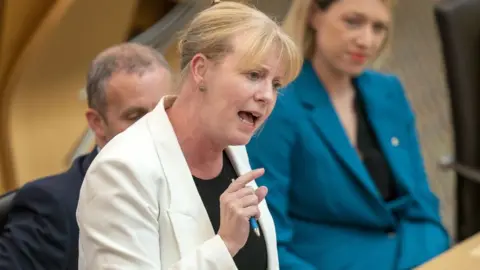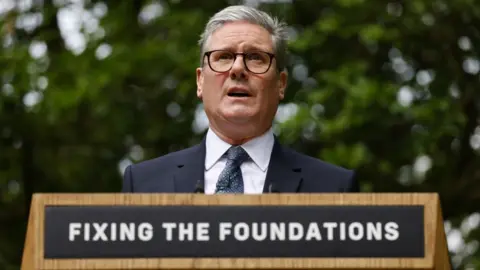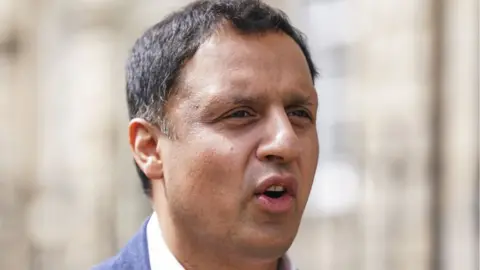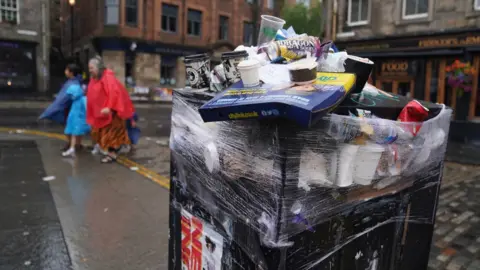SNP choices contributing to financial pressure - watchdog
 PA Media
PA MediaThe Scottish government's own decisions are to blame for “much of the pressure" facing the country's finances, a watchdog has said.
The Scottish Fiscal Commission (SFC) – the official independent economic forecaster - warned the SNP government would need to make “difficult decisions” to balance its budget.
It also highlighted “significant uncertainty” about UK government funding for Holyrood.
Finance Secretary Shona Robison has introduced emergency curbs on spending, describing them as “unavoidable”.
She has said cuts are required to fund public sector pay deals, while accusing the UK government of an "attack" on Holyrood's finances.
Prime Minister Sir Keir Starmer has warned that October's UK Budget would be "painful", citing a a £22bn black hole in Treasury finances.
He said he had no other choice and those with the broadest shoulders "should bear the heavier burden".
 Getty Images
Getty ImagesMs Robison is due to set out in-year cuts in a statement to parliament next week. The Scottish government will announce more comprehensive spending plans for 2025-26 in its budget later this year.
As it released a report on the state of the country's finances, the SFC said while decisions made by the UK government had contributed to pressure on the Scottish public purse, “much of the pressure comes from the Scottish government’s own decisions”.
It said a council tax freeze, more generous public sector pay deals than in other parts of the UK and social security reforms had all “added to the in-year pressures”.
SFC chairperson Prof Graeme Roy said: “The past choices of the Scottish government narrow its room for manoeuvre now and in the future.”
He added: “With pay making up more than half of the Scottish government’s day-to-day budget, we need more transparency and planning around pay awards at budget time to avoid disruptive spending controls being introduced part way through the year.”
The commission said the government had budgeted for a 3% limit to pay increases, but that this would be exceeded by agreements being struck, with more negotiations under way.
On devolved welfare benefits, it said ministers have chosen to spend £900m more than the Treasury allocated in a block grant, and that is on course to reach £1.5bn within five years.
'Difficult decisions'
Ms Robison said it would have been "impossible" for the Scottish government to budget for public sector pay rises of more than 3% and that her only option was to fund them was in-year cuts.
She told BBC Scotland News that pay deals and investing in social security had “of course” added financial pressures but that the SNP administration had always managed to balance its budget, as it legally required to do.
“What makes it very difficult though is the uncertainty around UK government funding and inflation,” Ms Robison said.
“This is not unique to Scotland but we will get on, we will make some of the difficult decisions that we have to make but we need some honesty from the Labour Party around ushering in a new era of austerity which will have a major impact on public services here in Scotland.”
 PA Media
PA MediaScottish Labour leader Anas Sarwar said it was "absurd" and "laughable" for the Scottish government to suggest in-year spending cuts were a response to the statement made by Chancellor Rachel Reeves in July, when she announced some cuts to help plug a "black hole" in the public finances.
Mr Sarwar told BBC Scotland News: “This is an SNP government that is looking for somebody else to blame, not taking responsibility and after 17 years people are paying the price.
“The incompetence has to end, the economic carnage has to end and the waste has to end.”
Scottish Conservative leader Douglas Ross, meanwhile, said it was “completely disingenuous” for Labour to blame the UK’s financial position on the previous Tory administration in Downing Street.
'Extremely poor choices'
He also accused the Scottish government of trying to “blame everyone but themselves” for the economic situation in Scotland.
The outgoing Tory leader said the Scottish government had made some “extremely poor” choices in the 17 years since the SNP took power.
He told BBC Scotland News: “Now we are going to face the brunt of those choices with big cuts coming down the line by the looks of things.”
To help fund public sector pay deals and avoid strikes in Scotland, Ms Robison has ordered a halt to all non-essential spending, as well as a recruitment freeze for all but the most pressured jobs in the NHS.
 PA Media
PA MediaAhead of the announcement next week, some spending decisions have already been announced – including introducing means tested winter fuel payments, the return of peak rail fares, scrapping free bus travel for people in the asylum system and delaying a digital devices programme.
Funding for other projects, including flood defences, nature restoration and the expansion of free school meals, will also be diverted to fund council wage settlements.
The Scottish government recently provided extra funding to help Cosla offer a pay increase of at least 3.6% to local authority workers.
Pay deals for doctors, nurses and teachers are yet to be agreed.
Ms Robison has said pay increases were not be fully funded and would require cuts from other areas.
